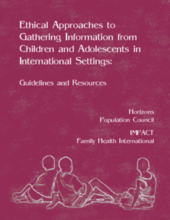To improve the lives of children and adolescents it is necessary to find out about their circumstances, their needs, and the services they require to meet their needs. Researchers who gather this information in order to develop and evaluate appropriate responses to the needs of children and adolescents must maintain high ethical standards in order to protect and respect them.
Observing ethical standards is important for all information gathering that involves people, including program monitoring and evaluation and research studies. However, extra precautions are needed to protect young people, who are especially vulnerable to exploitation, abuse, and other harmful outcomes.
This publication was developed in response to a growing need for practical guidance on collecting information from and about young people. The initial need for such recommendations was identified in the context of activities being conducted among children and adolescents affected by HIV and AIDS. However, they apply equally well to gathering information from young people to address other health and social welfare conditions and difficult circumstances, such as those who have experienced abuse, trafficking, or displacement.
Ultimately, this document aims to provide guidance through a maze of ethical issues that require consideration when working with young people. It is not a methodological handbook describing approaches to working with young people. Although methodological and ethical concerns may often overlap, for example when considering interview techniques suitable for use with children, investigators should refer to other sources for specific methodological guidance (as listed in Annex 1 of this paper).
©The Population Council Inc.

